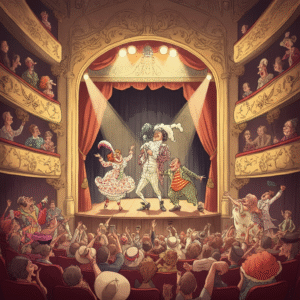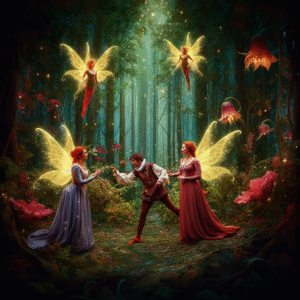
Introduction
Comedy plays, which provide wit, comedy, and deep insights into human nature, have long been a mainstay of theatrical expression. From historic stages to contemporary theaters, they continue to occupy a unique place in the hearts of viewers everywhere. From their distinguishing traits and historical origins to their cultural influences and timeless instances, this all-inclusive book examines comedy plays in all their splendor. Continue reading to learn about the enchantment of comedy play if you’ve ever pondered why these performances have such enduring appeal.

What Is a Comedy Play?
A comedy play is fundamentally a theatrical production intended to amuse and delight. Even though these plays are known for their comedy, they frequently address difficult subjects in humorous ways. Exaggerated characters, smart banter, and joyful endings are hallmarks of comedy plays. They provide nuanced societal critiques under the veil of humor, striking a mix between intellectual stimulation and amusement.
Comedy plays are immensely adaptable, whether they are 20th-century absurdist plays, Shakespeare’s love comedies, or contemporary satirical compositions. They combine universal themes with particular cultural quirks to appeal to a wide range of consumers.
Characteristics of Comedy Plays
Every comedy play shares key characteristics that set it apart from other dramatic genres. Below are some hallmarks of comedy plays:
- Light-Hearted Tone: Comedy plays have an optimistic tone, focusing on resolutions rather than tragedies.
- Exaggerated Characters: Larger-than-life characters amplify humor and conflict.
- Familiar Situations: They often depict scenarios that are relatable or reflective of societal norms, making the humor accessible.
- Happy Endings: Most comedy plays conclude on a positive note, bringing satisfaction and closure to audiences.
- Witty Dialogue: Clever writing and sharp wit are staples, whether it’s Shakespeare’s wordplay or Oscar Wilde’s satire.
- Fast-Paced Plots: A quick pace keeps the audience engaged from start to finish.
- Social Commentary: While humorous, many comedy play subtly critique societal issues and norms.
The Purpose of Comedy Plays
Comedy plays have a deeper purpose than just entertaining. They act as a mirror reflecting the oddities, hypocrisies, and absurdities of society. These plays help audiences develop a common understanding of the human condition by having them laugh at situations that are familiar. They also offer respite from the stresses of everyday life, which is a characteristic that has always been appealing to people of various backgrounds and times.

A Look Back in Time: The Evolution of Comedy Plays
Comedy plays have a rich and diverse history, much like the genre itself. One can appreciate how they influenced and were influenced by the communities they entertained by comprehending their evolution.
1. The Ancient Beginnings
- Greek Comedy
Ancient Greece is where comedy plays first appeared. With plays like Lysistrata and The Clouds, playwrights like Aristophanes laid the groundwork for contemporary humor. Greek comedies frequently featured political satire that ridiculed the ruling class of the day.
- Roman Comedy
Roman playwrights such as Plautus and Terence built on Greek ideas to produce comedies that were full of misunderstandings and situational humor. Because of its slapstick style and clichéd characters, such the cocky soldier or the cunning slave, Roman comedy was very popular.
2. Medieval and Renaissance Comedy
- Morality and Religious Comedies
During the Middle Ages, comedic performances were often part of religious plays aimed at teaching moral lessons alongside entertainment.
- The Renaissance Spark
Thanks to the talent of authors like William Shakespeare, whose romantic comedies (A Midsummer Night’s Dream, Much Ado About Nothing) are still beloved today, the Renaissance signaled the beginning of a golden age for comic plays. These plays, which featured gender roles, mistaken identities, and captivating subplots, expertly combined humor and emotion.
3. 17th and 18th Century Comedies
- French and English Comedy of Manners
The comedy of manners—scathing, satirical plays centered on social conventions, class, and romantic intrigues—rose to prominence in the 17th and 18th centuries. English writers like Richard Sheridan (The Rivals) made waves with their subtle wit, while Molière’s masterpieces like Tartuffe transformed French theater.
4. Modern Comedy Plays
- 20th Century Absurdism and Beyond
Fast-forward to the modern era, playwrights like Samuel Beckett (Waiting for Godot) and Harold Pinter (The Birthday Party) introduced absurdist humor, challenging conventional storytelling.
- Contemporary Comedy Plays
Comedy plays today are more varied than ever before, using creative scripts to explore subjects like relationships, politics, and identity. Self-aware humor that appeals to modern audiences can be seen in works such as The Play That Goes Wrong.

Timeless Comedy Plays You Need to Know
Comedy plays have gifted us countless masterpieces that have stood the test of time. Here are some of the most iconic examples:
1. Shakespeare’s Comedies
- A Midsummer Night’s Dream: A tale of love, magic, and mistaken identity.
- Twelfth Night: A gender-bending story with elements of romantic chaos and sharp wit.
2. The Importance of Being Earnest by Oscar Wilde
Known as a hallmark of the comedy of manners, this play is celebrated for its biting satire and impeccable wit.
3. Noises Off by Michael Frayn
Noises Off is a classic farce that transforms theatrical turmoil into a comedy masterclass and is regarded as one of the funniest plays of the contemporary era.
4. Arms and the Man by George Bernard Shaw
This play, which is a romantic comedy with Shaw’s signature social satire, skillfully blends humor with provocative subjects.
5. Peter and the Starwatcher by Rick Elice
A relatively modern classic, this prequel to Peter Pan brings imaginative storytelling and witty humor to a beloved tale.
Why Comedy Plays Matter
Comedy plays have a special role in the entertainment industry. They do much more than just make people laugh; they offer a forum for introspection, empathy, and cross-cultural dialogue. These performances are still important for the following reasons:
1. Promoting Social Dialogue
Comedy plays use humor and satire to encourage viewers to think critically about current events, from everyday absurdities to governmental corruption.
2. Building Community
Shared laughter has the power to connect people. Comedy plays create a collective experience that’s both cathartic and joyous.
3. Relieving Stress
Humor is one of the most effective ways to combat stress, making comedy play a perennial source of joy and relaxation.

The Future of Comedy Plays
Comedy plays are changing as a result of technological and narrative developments. More playwrights are experimenting with different formats, such as multimedia-infused plays and interactive theater. The emergence of humor in various cultures is also exposing audiences around the world to new aesthetics and viewpoints. Comedy plays are kept lively and current by this ongoing modification.
Final Thoughts
Comedy plays are cultural gems that shed light on the peculiarities and complexity of life, and they are more than just a source of entertainment. Their ability to make us laugh while entertaining, educating, and challenging social norms is what gives them their everlasting appeal. Comedy plays promise to be an unforgettable and enlightening experience, regardless of whether you’re watching a modern production or a Shakespearean classic.

Takeaway
Laughter, after all, is universal. And as long as there’s comedy in the world, there will be comedy plays to enliven our spirits.





Leave a Reply